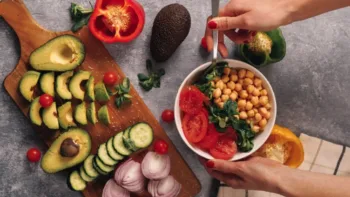
So, you’ve been hearing a lot about plant-based diets lately, right? It seems like everyone, from your next-door neighbor to your favorite Instagram foodie, is raving about the wonders of reducing meat in their diet.
But what’s all the fuss really about? Is it just another health trend, or is there something more to it? Let’s dive into the real benefits of going plant-based and why cutting down on meat could be one of the best decisions you make for your health.
Less Meat, More Love for Your Heart
One of the most compelling reasons to reduce meat consumption is the positive impact it can have on your heart. Heart disease is the leading cause of death worldwide, and what you eat plays a significant role in either contributing to or protecting against this condition.
Studies have shown that diets rich in fruits, vegetables, whole grains, and legumes—key components of a plant-based diet—can significantly lower your risk of heart disease. This is largely because plant-based foods are naturally low in saturated fats, which are often found in high amounts in meat, especially red and processed meats.
When you consume too much saturated fat, it can lead to the build-up of cholesterol in your arteries, narrowing them and increasing the risk of heart attacks and strokes.
But it’s not just about avoiding the bad stuff. Plant-based foods are also rich in fiber, antioxidants, and other nutrients that actively work to improve your heart health.
For example, fiber helps to lower cholesterol levels by binding to cholesterol in your digestive system and removing it from your body before it can be absorbed into your bloodstream. Antioxidants found in fruits and vegetables help to reduce inflammation, another key factor in heart disease.
Additionally, plant-based diets are often associated with lower blood pressure, a major risk factor for heart disease. The potassium found in fruits and vegetables helps to balance the sodium in your body, which can help to reduce blood pressure.
So, by cutting down on meat and embracing a plant-based diet, you’re not just reducing your risk of heart disease; you’re actively nurturing your heart and giving it the best chance to stay healthy and strong for the long haul.
Shed Pounds Without the Stress
Trying to lose weight can be a frustrating and overwhelming experience, especially with the plethora of fad diets out there promising quick results but often leaving you feeling deprived and discouraged. A plant-based diet offers a sustainable and enjoyable approach to weight management that doesn’t involve extreme calorie restriction or giving up your favorite foods.
One of the key benefits of a plant-based diet is that it’s naturally lower in calories and higher in nutrients compared to a diet heavy in meat and processed foods. This means that larger portions of satisfying, nutrient-dense foods can come without excess calories.
Vegetables, fruits, whole grains, and legumes are all filling foods that provide essential vitamins, minerals, and fiber while being low in calories.
Fiber, in particular, plays a crucial role in weight management. It slows down digestion, helping you feel full for longer, which can reduce your overall calorie intake. Additionally, high-fiber foods tend to be bulkier, taking up more space in your stomach and signaling to your brain that you’re full. This can help prevent overeating and make it easier to maintain a healthy weight without feeling like you’re constantly battling hunger.
Another benefit of plant-based diets is that they tend to be lower in energy-dense foods, meaning they provide fewer calories per gram compared to high-fat, high-sugar foods.
This allows you to eat a larger volume of food while still staying within your calorie goals, making it easier to achieve and maintain a healthy weight. And with the wide variety of delicious plant-based recipes available today, you won’t feel like you’re missing out on anything.
Plus, there’s evidence to suggest that people who follow a plant-based diet are more likely to maintain their weight over the long term compared to those who follow other types of diets. This is likely due to the fact that plant-based diets are more sustainable and easier to stick with, as they don’t involve extreme restrictions or the need to constantly count calories.
So, if you’re looking for a healthy and enjoyable way to manage weight, reducing your meat consumption and embracing a plant-based diet could be the answer you’ve been searching for.
Glow from the Inside Out
Believe it or not, what you eat can have a big impact on your skin. While there’s no magic bullet for perfect skin, a healthy diet rich in fruits, vegetables, and other plant-based foods can help you achieve a clearer, more radiant complexion.
Diets high in fruits and vegetables are packed with vitamins, minerals, and antioxidants that nourish your skin from the inside out. For example, the vitamin C found in citrus fruits and leafy greens helps to boost collagen production, keeping your skin looking firm and youthful. Collagen is a protein that provides structure to your skin, and as you age, your body’s collagen production naturally declines. By consuming vitamin C-rich foods, you can help to support your body’s collagen production and maintain healthy, youthful-looking skin.
In addition to vitamin C, plant-based foods are also rich in other skin-loving nutrients, such as vitamin E, beta-carotene, and omega-3 fatty acids. Vitamin E, found in nuts and seeds, is a powerful antioxidant that helps to protect your skin from damage caused by free radicals.
Beta-carotene, found in carrots, sweet potatoes, and other orange-colored vegetables, is converted into vitamin A in your body, which helps to promote cell turnover and maintain healthy skin.
Omega-3 fatty acids, found in flaxseeds, chia seeds, and walnuts, help to keep skin hydrated and reduce inflammation, which can help to prevent acne and other skin issues. These healthy fats also support your skin’s natural barrier, helping to lock in moisture and protect against environmental damage.
A Healthier You, A Healthier Planet
While this one might not be a direct health benefit, it’s worth mentioning that by reducing your meat consumption, you’re also doing your part to protect the planet. The environmental impact of meat production is significant, contributing to deforestation, water pollution, and greenhouse gas emissions.
Animal agriculture is a leading cause of deforestation, as forests are cleared to make way for livestock grazing and feed crop production. This deforestation not only destroys habitats for countless species but also contributes to climate change by releasing carbon stored in trees into the atmosphere.
Additionally, the production of meat requires large amounts of water, both for the animals themselves and for the crops used to feed them. This contributes to water scarcity in many parts of the world.
Greenhouse gas emissions from animal agriculture, including methane from livestock and carbon dioxide from deforestation and fossil fuel use, are a major driver of climate change. By reducing your meat consumption and choosing more plant-based meals, you’re helping to reduce your carbon footprint and mitigate the impact of climate change.
And let’s be honest, knowing you’re doing something good for the planet feels pretty great, doesn’t it? By making the choice to reduce your meat consumption, you’re not only improving your own health but also contributing to a healthier, more sustainable future for everyone.
The Meat of the Matter
Switching to a plant-based diet doesn’t mean you have to give up meat entirely—unless you want to, of course. It’s all about balance and making choices that are good for your body and your overall well-being. Whether you’re looking to boost your heart health, manage your weight, or simply feel better in your skin, reducing your meat consumption and embracing more plant-based foods is a step in the right direction.
So why not give it a try? Start small by incorporating more fruits, vegetables, whole grains, and legumes into your meals and gradually reduce your meat intake. You might be surprised at how easy and enjoyable it can be to make the switch. Plus, with all the delicious plant-based options available today, you won’t feel like you’re missing out on anything.
By Admin –



